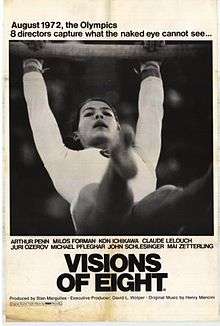Visions of Eight
| Visions of Eight | |
|---|---|
 Film poster | |
| Directed by |
Miloš Forman Claude Lelouch Yuri Ozerov Mai Zetterling Kon Ichikawa John Schlesinger Arthur Penn Michael Pfleghar |
| Produced by |
Stan Margulies David L. Wolper |
| Written by |
David Hughes Deliara Ozerowa Shuntaro Tanikawa |
| Music by | Henry Mancini |
| Cinematography |
Arthur Wooster Alan Hume Daniel Bocly Michael J. Davis Rune Ericson Walter Lassally Jorgen Persson Igor Slabnevich Ernst Wild Masuo Yamaguchi |
| Edited by |
Dede Allen Catherine Bernard Jim Clark Lars Hagstrom Edward Roberts Margot von Schlieffen |
| Distributed by | Cinema 5 |
Release dates |
|
Running time | 110 minutes |
| Country | United States |
| Language | English |
Visions of Eight is a 1973 American documentary film, produced by David L. Wolper and Stan Margulies, offering a stylized look at the 1972 Summer Olympics, directed by eight different directors. It was screened at the 1973 Cannes Film Festival, but wasn't entered into the main competition.[1] It was later shown as part of the Cannes Classics section of the 2013 Cannes Film Festival.[2] Some visuals of the Munich stadium from the documentary were used in Without Limits.[3]
Directors
Wolper asked eight directors to select their own crews and create a segment which would capture some aspect of the Munich Games.
- Miloš Forman directed The Decathlon
- Kon Ichikawa directed The Fastest
- Claude Lelouch directed The Losers
- Yuri Ozerov directed The Beginning
- Arthur Penn directed The Highest
- Michael Pfleghar directed The Women
- John Schlesinger directed The Longest
- Mai Zetterling directed The Strongest
Production
Alan Hume shot the segment The Fastest for director Kon Ichikawa. Arthur Wooster shot The Longest for director John Schlesinger, and Walter Lassally directed the photography for Arthur Penn's segment The Highest.[4]
Reception
Visions of Eight won the best documentary award at the Golden Globe Awards, held in 1974 for films which were released in 1973.
Peter Rainer of Bloomberg News Service noted that only Schlesinger bothered to be aware of the terrorist tragedy at the Munich Games. "Schlesinger’s is the only segment that fully acknowledges the Black September terrorist attacks, in which 11 Israeli athletes and coaches, and a West German policeman, were murdered."
Rainer continues, "Penn’s entry begins daringly. Not only is the imagery a slo-mo crawl, it’s also out of focus and the soundtrack is silent. Gradually the visuals sharpen, the stadium sounds come up, but, for the most part, the pole vaulters rising into the sky remain superslow abstractions. Along with his great editor Dede Allen, who cut Bonnie and Clyde, Penn anatomizes the action without ever losing sight of the fact that these athletes, including USA’s Bob Seagren, are men and not gods (as Riefenstahl might have us believe)" — referring to Leni Riefenstahl's 1938 documentary Olympia.
Rainer sees French director Claude Lelouch's segment as a welcome contrast to the other directors' worshipful heroic depictions: "Lelouch’s The Losers ... shows us a boxer who rants in the ring after his defeat; wrestlers gamely trying to fight after tearing ligaments and dislocating limbs; swimmers treading befuddled in the pool after their last losing lap."[5]
See also
References
- ↑ "Festival de Cannes: Visions of Eight". festival-cannes.com. Retrieved April 20, 2009.
- ↑ "Cannes Classics 2013 line-up unveiled". Screen Daily. Retrieved April 30, 2013.
- ↑ Hartl, John (October 4, 1998). "Movies -- Prefontaine's Tragic Life Gets Another Onscreen Run". The Seattle Times. Retrieved December 30, 2013.
- ↑ Alan Hume, Gareth Owen, Peter Rogers (2004). A Life Through the Lens: Memoirs of a Film Cameraman. McFarland & Company. p. 84. ISBN 9780786418039.
- ↑ Peter Rainer, "Munich Olympics, Murders Caught in 'Visions of 8' July 28, 2012 Bloomberg.com http://www.bloomberg.com/news/2012-07-29/munich-olympics-murders-caught-in-visions-of-8-dvd.html